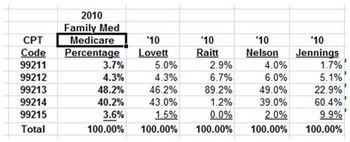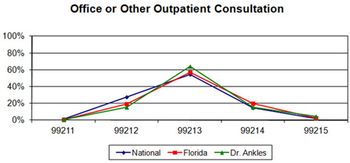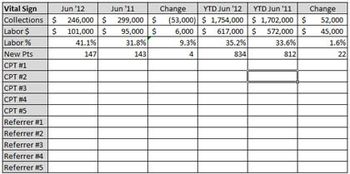
Make sure you give your patients your full attention and resist the temptation to multitask on your smartphone. Forcing them to compete for your presence tells patients they come in last on your list.

Make sure you give your patients your full attention and resist the temptation to multitask on your smartphone. Forcing them to compete for your presence tells patients they come in last on your list.

Achieve meaningful use, increase profitability, and improve quality care with your patient portal.

While many practices have a compliance plan, most sit on a shelf gathering dust. Take it down, dust it off, and read it. Unenforced, it could be your worst enemy.

There are many misconceptions about what it takes to be effective in marketing a medical practice. The best approach is to have a plan - a comprehensive, written marketing plan.

Exit interviews tell you why good people are leaving – after they've left. Stay interviews help understand an employee's concerns while she is still on the job.

By now you have likely encountered the term "Patient-Centered Medical Home" or PCMH. If you do not yet know what a "medical home" is, think of it this way - these are practices that use care teams to put the patient at the center of the healthcare delivery system.

Whether you work for a huge medical conglomerate or a small private clinic, you may not have much say regarding what you wear to do your job. You do, however, have full control over how you wear it.

Strategic planning as a process implies a look at the future and anticipation of changes. Your practice mission statement, values, and past performance will all dictate how your practice will respond to future events.


As anti-fraud efforts step up, there's little doubt that the OIG will be looking at your practice. Make sure your patient records accurately reflect physician services.

Do you think your patients would rather be educated by their provider or by Dr. WebMD? Make your practice the place patients can go to learn about their healthcare from the person they trust most - you.

Here is what your medical practice needs to know about HCPCS codes, where they fit with CPT codes, and how to understand them.

You may be a good leader at your medical practice, but becoming great requires good instincts, experience, and hard work.

Don't let your practice be caught up in Medicare's recovery program. It's a simple matter to examine your own coding patterns and compare them to national utilization data.

The best way to optimize your sales price, no matter what the market conditions are like, is to optimize your operations.

Whether you're the one who's constantly running behind or the person who continually seems to be waiting for others, these five points will save everyone valuable time.

Does your practice act upon patient data gathered at intake and record it in such a way that it can be tied to clinical quality indicators? If not, you may be missing out on additional revenue.

By empowering your staff, you can improve the performance, care, and service your practice provides. Some call the concept employee empowerment, others call it employee engagement; I call it common sense.

Medical practices have traditionally focused on patient care, leaving the business end to administrators. Now, as health reform advances, practice models are rapidly changing. Here's how to embrace the changes.

CMS is stepping up efforts to ferret out fraud through its new Center for Program Integrity. Here's what your practice can do to stay below its radar.

A natural solution to an increased workload is to recruit for a new physician. Having a plan makes the process much more effective for both the new recruit and your practice.

Every single day, an estimated 10,000 people in this country are turning 65. If you haven't made your practice senior-friendly, now is the time.

All of the parties involved in a physician recruitment agreement need to make sure the documents protect everyone involved to ensure the best outcome.

Receiving maximum practice compensation requires everyone to be on board. If you have a partner who simply won't comply with practice goals that can really hamper your practice. Here's what you can do to motivate your docs.

Here are five key things to keep in mind regarding recruitment agreements between physicians and hospitals.

The break room is the one place people can go for a reprieve from the demands of a busy medical practice. All too often, though, it's a mess. Here are a few tips to help stem the chaos.

Fix the rift between front- and back-office staff with these strategies.

Most physicians have a limited amount of time to monitor the fiscal health of their practices. However, it is possible. Here are five quick measures to make the task easier.

Don't miss out on easy income. Incorporating Medicare's AWV into your care plan helps both your practice and your patients.

Hiring an administrator or practice manager may be one of the most significant hires you make. But how do you hire one successfully?